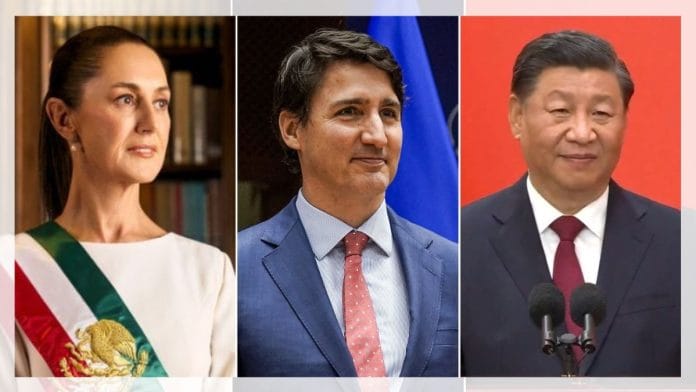New Delhi: China has vowed to sue the US at the World Trade Organisation (WTO) while Canada and Mexico have promised their own retaliatory tariffs as American President Donald J. Trump Saturday announced new tariffs on all imports from the three countries, setting the stage for a trade war.
“President Trump is taking bold action to hold Mexico, Canada, and China accountable to their promises of halting illegal immigration and stopping poisonous fentanyl and other drugs from flowing into our country,” said the White House in a fact sheet on the new executive order, slapping new tariffs on the imports from the three countries.
With Canada and Mexico, Trump introduced a 25 percent tariff on all goods, except for Canadian oil and energy products, on which he has levied a 10 percent tariff. The American President also announced an additional tariff of 10 percent on all Chinese exports to the US. These tariffs will be implemented just after Tuesday midnight (4 February).
“China’s position is consistent and firm. There are no winners in trade wars and tariff wars. The unilateral imposition of tariffs by the United States seriously violates WTO rules and will not only fail to solve its own problems but will also be detrimental to both sides and the world,” said the Chinese foreign ministry in a statement Sunday.
Beijing added: “The US has imposed a 10% tariff on Chinese products exported to the US on the grounds of the fentanyl issue. China is strongly dissatisfied and firmly opposes this. China will take necessary countermeasures to firmly safeguard its legitimate rights and interests.”
For Trump, the additional tariffs on all three countries have been a long-standing promise, giving Canada, Mexico and China enough warning on how to retaliate against the recent announcement by the American President.
Trump has aimed at the alleged flow of fentanyl and illegal migrants from across the borders of these countries and has promised that the tariffs will remain until that has been sufficiently stemmed.
“Canada has played a central role in these challenges, including by failing to devote sufficient attention and resources or meaningfully coordinate with United States law enforcement partners to effectively stem the tide of illicit drugs,” said the executive order signed by the US President.
Also Read: India, US working on PM Modi’s ‘early visit’ following call with Trump, no dates yet
Canada announces retaliatory tariffs
On Saturday, Canadian Prime Minister Justin Trudeau announced retaliatory tariffs on roughly $155 billion worth of US imports, starting the same day as the American tariffs. On 4 February, $30 billion worth of goods will be impacted with 25 percent tariffs, followed by $125 billion worth of imports being hit with new tariffs three weeks later.
Ottawa has indicated that it will look to tax orange juice from Florida, whiskey from Tennessee and peanut butter from Kentucky—all Republican-led states, which Trump won during the 2024 US Presidential elections, according to media reports.
“The coming weeks will be difficult for Canadians, and they will be difficult for Americans. The level of cooperation, the level of effective partnerships between our two countries—that have been established over decades and generations—means that this trade action by the Americans and our response is going to have real consequences,” said Trudeau in a statement to the press.
The Canadian leader further added that “we did not ask for this”, but that Ottawa will not back down in standing up for the partnership between the US and Canada.
Trump’s executive order, however, has a clause attempting to discourage retaliatory tariffs, stating that the President could “increase or expand in scope the duties imposed under this order to ensure the efficacy of this action” in the event of retaliation by the targeted countries.
Mexico promises tariffs, asks US to clean up its streets
In a post on the social media platform X, Mexican President Claudia Sheinbaum Pardo pointed to the enforcement actions by her government in recent weeks, including the arrests of more than ten thousand people—linked to drug gangs—and the seizure of over 20 million doses of fentanyl, as proof its efforts to stop the flow of drugs into the US.
“If the United States government and its agencies wanted to address the serious consumption of fentanyl in their country, they could, for example, combat the sale of narcotics on the streets of their main cities, which they do not do, and the money laundering generated by this illegal activity that has done so much harm to their population,” said Sheinbaum in the social media post.
The Mexican President added: “They [the US government] could also start a massive campaign to prevent the consumption of these drugs and take care of their young people, as we have done in Mexico. Drug consumption and distribution is in their country, and that is a public health problem that they have not addressed.”
The Mexican President has instructed the secretary in charge of the economy to prepare tariffs and non-tariff measures in retaliation to Trump’s executive orders. Sheinbaum, however, has not stated how far Mexico City is willing to go.
(Edited by Madhurita Goswami)
Also Read: Jaishankar calls for closer ties with West Asia under shadow of Trump’s competitive foreign policy







Suing the US at WTO is meaningless. It might just walk out, as it has done for WHO and the Paris Accord. It has disabled WTO’ s appellate mech by blocking appointment of Judges. It routinely threatens to sanction members of the International Criminal Court. What would be described as rogue actor for a lesser entity is how the world should get used to US exceptionalism.